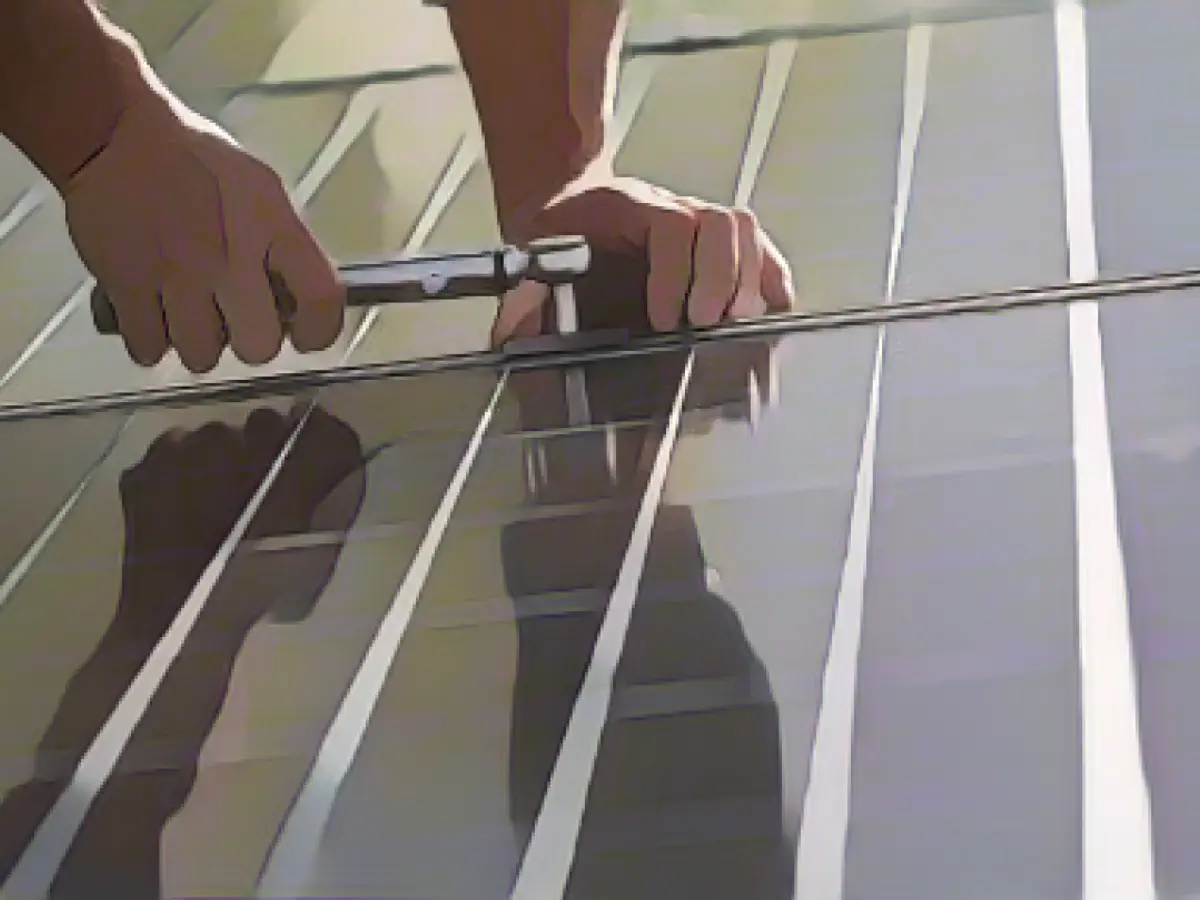Solar industry - After traffic light agreement: Meyer Burger still considers solar expansion possible
Even after the agreement of the traffic light coalition on cuts to solar subsidies, the solar company Meyer Burger still considers it possible to build additional capacities in Germany. Meyer Burger CEO Gunter Erfurt told Capital that an increase in production capacities for cells and modules within the framework of the Federal Ministry of Economics' expression of interest procedure is "still envisaged in principle" in the revised Climate and Transformation Fund. There are still talks with the German government on this, Erfurt added. He also referred to the latest funding commitment for Meyer Burger at EU level amounting to 200 million euros. This could possibly compensate for cuts at national level, he said.
On Wednesday, after weeks of wrangling, the Ampel presented an agreement for the 2024 federal budget. A package of savings and tax increases is intended to compensate for the gap left by the Federal Constitutional Court's ruling on the Climate and Transformation Fund (KTF). The list of savings also includes the planned funding for the reconstruction of the solar industry, which Federal Economics Minister Robert Habeck (Greens) is pushing forward in order to reduce Europe's massive dependence on Chinese manufacturers. On Wednesday, Habeck counted the cuts in the solar sector among the decisions that "hurt" him. The domestic solar industry is currently suffering from a sharp drop in prices, triggered not least by dumping prices from producers in China, which dominate the global market. Meyer Burger has recently repeatedly warned against shifting more investments to the USA, where the state lures greentech companies with lavish subsidies.
Specifically, the cuts that have now been decided concern a program with which the federal government wants to promote "lighthouses" in the solar industry - such as the listed Swiss company Meyer Burger, Europe's only solar cell manufacturer on a gigawatt scale, which has been producing cells and modules in Saxony-Anhalt and Saxony since 2020. This involves investment funding for the expansion of further production capacities. The funding amount reserved in the KTF for 2024 and 2025 is now to be reduced by half. However, the process launched by Habeck's ministry in the summer to allow companies to register their interest in the program is to be continued. "There has been no change in the political agenda to rebuild the solar industry in Germany," said Erfurt. Overall, the signals from Berlin are "much more positive" than the initial reactions to the budget agreement of the traffic light government would suggest. However, the capacity expansion to be stimulated by the program will probably be less than the originally planned ten gigawatts due to the cutbacks.
"Resilience bonuses" still possible for the solar industry
The Meyer Burger CEO also emphasized that no cuts are planned in the area of EEG subsidies and the planned solar package 1. Since last year, the remuneration for solar and wind systems has also been financed entirely via the KTF. The Bundestag is currently discussing a solar package which, among other things, is intended to reduce bureaucracy for system operators. The solar industry and parts of the Ampel are arguing that special funding categories for photovoltaic systems manufactured in Europe should also be introduced as part of the legislative process. These are intended to compensate for cost disadvantages compared to Chinese manufacturers during the reconstruction phase of the domestic solar industry.
The energy companies RWE and EnBW also recently lobbied Habeck for such "resilience tenders" and "resilience bonuses" based on a concept developed by the solar association BSW. According to BSW, the costs for this will amount to around 40 million euros in the coming year and a three-digit million amount later on. Together with other manufacturers, the association is in close contact with the German government regarding the resilience incentives, said Erfurt. The SPD and the Greens support the concept, and parts of the CDU/CSU are also open to it. However, the FDP has so far put the brakes on.
There are also various initiatives at EU level, so-called net-zero industries, to strengthen the solar industry. Meyer Burger recently received a commitment of 200 million euros from an EU Innovation Fund funding program for a project called "Hope". "We have these funds for sure," said Erfurt. The amount covers part of the investment costs for the possible construction of cell and module factories with 3.5 gigawatts, for which the company had applied under the EU Innovation Fund.
This article first appeared in "Capital"
Read also:
- Why there is still no EU funding for green Saar steel
- 3 billion Saar Fund is unconstitutional
- Politicians at a loss after shock news
- Court of Auditors criticizes the state government's debt plan
- Despite the traffic light coalition's decision to reduce solar subsidies, Meyer Burger, a solar company, continues to consider the possibility of expanding capacities in Germany.
- The Federal Ministry of Economics, led by Robert Habeck (Greens), is pushing to reduce Europe's reliance on Chinese solar manufacturers in the solar industry.
- Meyer Burger, a Swiss company and one of Europe's largest solar cell manufacturers, is still in discussions with the German government regarding solar expansion plans.
- The EU has committed 200 million euros in funding to Meyer Burger, which could potentially offset any national-level cuts.
- Habeck, the Federal Economics Minister, expressed concern over the cuts decided for the solar industry, as the domestic sector is currently suffering from lower prices due to Chinese competition.
- The Federal Constitutional Court's ruling on the Climate and Transformation Fund (KTF) led to the Ampel presenting an agreement aimed at reducing the gap in the 2024 federal budget.
- Meyer Burger has expressed concerns about shifting more investments to the USA, where the government offers substantial subsidies for greentech companies.
Source: www.stern.de








